Related Research Articles

Grazia Maria Cosima Damiana Deledda, also known in Sardinian language as Gràssia or Gràtzia Deledda, was an Italian writer who received the Nobel Prize for Literature in 1926 "for her idealistically inspired writings which with plastic clarity picture the life on her native island [i.e. Sardinia] and with depth and sympathy deal with human problems in general". She was the first Italian woman to receive the prize, and only the second woman in general after Selma Lagerlöf was awarded hers in 1909.

Dario Luigi Angelo Fo was an Italian actor, playwright, comedian, singer, theatre director, stage designer, songwriter, painter, political campaigner for the Italian left wing and the recipient of the 1997 Nobel Prize in Literature. In his time he was "arguably the most widely performed contemporary playwright in world theatre". Much of his dramatic work depends on improvisation and comprises the recovery of "illegitimate" forms of theatre, such as those performed by giullari and, more famously, the ancient Italian style of commedia dell'arte.
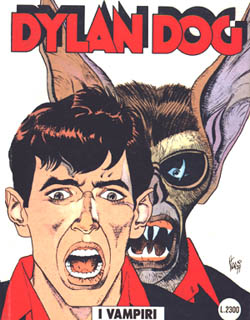
Dylan Dog is an Italian horror comics series created by Tiziano Sclavi and published by Sergio Bonelli Editore since 1986.

Eduardo De Filippo, also known simply as Eduardo, was an Italian actor, playwright, and screenwriter, best known for his Neapolitan works Filumena Marturano and Napoli Milionaria. Considered one of the most important Italian artists of the 20th century, De Filippo was the author of many theatrical dramas staged and directed by himself first and later awarded and played outside Italy. For his artistic merits and contributions to Italian culture, he was named senatore a vita by the Italian Presidente della Repubblica Sandro Pertini.
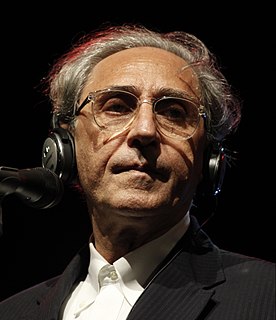
Francesco "Franco" Battiato was an Italian singer-songwriter, composer, filmmaker and, under the pseudonym Süphan Barzani, also a painter. Battiato's songs contain esoteric, philosophical and religious themes, and have spanned genres such as experimental pop, electronic music, progressive rock, opera, symphonic music, movie soundtrack, oratorio and new wave.

Calogero "Don Calò" Vizzini was a historical Sicilian Mafia boss of Villalba in the Province of Caltanissetta, Sicily. Vizzini was considered to be one of the most influential and legendary Mafia bosses of Sicily after World War II until his death in 1954. In the media, he was often depicted as the "boss of bosses" – although such a position does not exist in the loose structure of Cosa Nostra.

Omero Antonutti was an Italian actor and voice actor.

Goffredo Parise was an Italian writer, journalist, and screenwriter. He won the Viareggio Prize in 1965 for his novel Il padrone(The Boss) and the Strega Prize in 1982 for Sillabario n.2.

Paolo Taviani and Vittorio Taviani, collectively referred to as the Taviani brothers, were Italian film directors and screenwriters who collaborated on film productions.
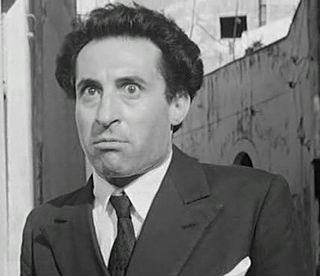
Leopoldo Trieste was an Italian actor, film director and script writer.

The Greco Mafia family is historically one of the most influential Mafia clans in Sicily and Calabria, from the late 19th century. The extended family ruled both in Ciaculli and Croceverde Giardini, two south-eastern outskirts of Palermo in the citrus growing area and also rural areas of Calabria where they controlled the olive oil market. Members of the family were important figures in the Sicilian Cosa Nostra and Calabrian 'Ndrangheta. Salvatore "Ciaschiteddu" Greco was the first ‘secretary’ of the Sicilian Mafia Commission, while Michele Greco, also known as The Pope, was one of his successors.

Gavino Ledda is an author and a scholar of the Italian language and of Sardinian. He is best known for his autobiographical work Padre Padrone (1975).
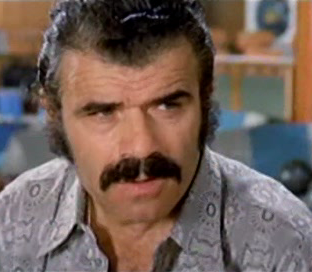
Tano Cimarosa, real name Gaetano Cisco, was an [Italian actor, screenwriter and film director. He participated in more than fifty movies.
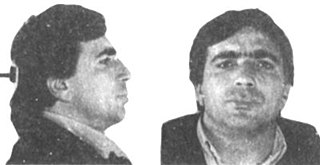
Michele Zagaria is an Italian Camorrista and one of the bosses of the Casalesi clan from Casal di Principe in the province of Caserta northwest of Naples. He was nicknamed Capastorta, which translates to "twisted head", because of his violent reputation.

The Nuvoletta clan was a powerful Neapolitan Camorra clan operating from the town of Marano di Napoli, situated on the northern outskirts of the city of Naples, southern Italy. The clan was affiliated with several Sicilian Mafia families and was considered one of the most powerful Camorra clans between the 1970s and 1990s, however, since the death of its historical leaders and the large number of arrests and seizures made by the Italian police, the clan was succeeded by the Polverino and Orlando clans, both families with great degree of kinship with the Nuvoletta family.

Salvatore Riina, called Totò 'u Curtu, was an Italian mobster and chief of the Sicilian Mafia, known for a ruthless murder campaign that reached a peak in the early 1990s with the assassinations of Antimafia Commission prosecutors Giovanni Falcone and Paolo Borsellino, resulting in widespread public outcry and a major crackdown by the authorities. He was also known by the nicknames la belva and il capo dei capi.

Tony Renis, stage name of Elio Cesari, is an Italian singer, composer, music producer and film actor.
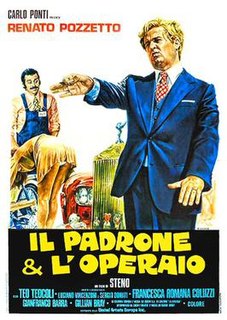
The Boss and the Worker is a 1975 Italian comedy film directed by Steno.

Lingwa de planeta is a constructed international auxiliary language based on widely spoken languages of the world, including Arabic, Chinese, English, French, German, Hindi, Persian, Portuguese, Russian, and Spanish.

Carcerato is a 1981 Italian melodrama film written and directed by Alfonso Brescia and starring Mario Merola.
References
- ↑ Tony Mitchell, The People’s Court Jester, Methuen Books, London, 1999.
- ↑ Online English translation: http://www.geocities.ws/dariofoarchive/lanzone.html Retrieved August 5, 2012.